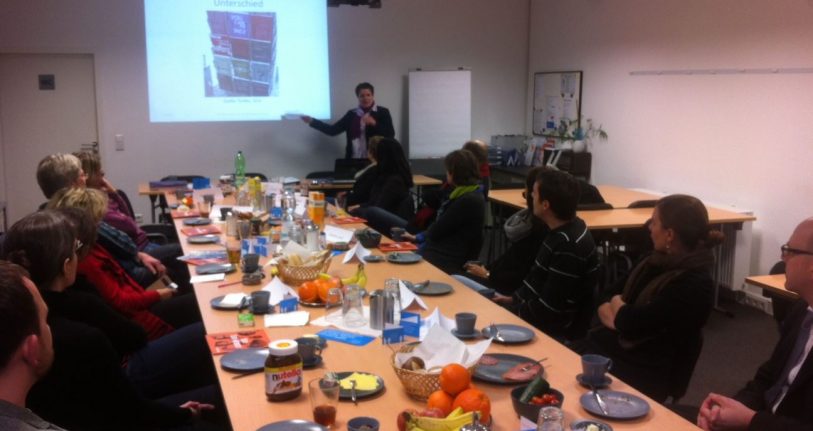Going Public about Translation
Else Gellinek
- February 6, 2015
- 4 min read
- Business and freelancing

As I announced in my New Year’s post, I gave a presentation for my local business network this week. Our networking group meets up every two weeks for breakfast, businessy chit chat and the occasional presentation. I am the one and only translator there. We kick off each meeting with a round of introductions and elevator pitches. So far, I have failed to spark interest in what I do, plainly evidenced by the polite yet bored expressions on everyone’s faces when my turn comes up.
How to interest others in translation?
Mention translation to non-translators and many of them will immediately flash back to unpleasant language learning experiences they had at school. Breaking through that mental barrier means we have to find a way to make what we do for our clients relatable to those who have no interest in the finer points of language. Translators are too often maligned as grammar nerds clutching a dictionary whose work takes place without any connection to the real world. We all know that’s not true, but many customers don’t.
That definitely raised the bar for my presentation about my translation business. Talking in public is daunting and now there was the added challenge of finding a way of framing our work to make others realize how interesting it is. No pressure! My presentation strategy: Steer clear of anything related to grammar, terminology, software, pricing, machine translation and all the shop-talk we translators like to engage in. Nonetheless, I did want to send my audience home with a deeper understanding of the intricate expertise translation requires.
Focusing on aspects that matter to clients
Whenever I take on a new project, I try and tickle as much information as possible out of my clients. They are often baffled why I would want all these details for a mere translation. And when I tell them why, they are again astonished because they’d had no idea that so many non-linguistic factors come into play during translation. And that is what my talk was about. Which non-linguistic factors impact the effectiveness of your marketing copy when translating it for a new target audience? And why should clients care?
I shared a few examples of cultural references that don’t work in translation and why you need to know the target audience to decide whether a reference can be translated or needs to be replaced or possibly even removed altogether. Then we touched on some stylistic aspects of marketing copy that can differ from country to country. Nothing groundbreaking, but the idea that translated marketing copy has to meet the same standards as the original copy if it’s supposed to do the same job was almost revolutionary for some of my listeners. (If you squint your eyes at the slightly blurry picture at the top of the post, you’ll see that everyone is paying rapt attention.)
Why aren’t we making ourselves heard?
After the presentation, there was a gratifyingly lively debate about how companies could be so shortsighted as to publish badly translated websites and why no one was aware of the crucial role of translations in a company’s marketing strategy. All good points. And I had to concede that translators may be good at translating marketing copy but we are obviously less talented at marketing our own services and the profession as a whole. And that’s a sobering realization. What’s the use of telling each other how great we are if we forget to let our clients in on our little secret?
PS I have been invited to give another presentation about translation for a different professional network. People are interested in learning about our services, if we’re actually willing to go out there and talk about them.
PPS Do you think that translators get the recognition they deserve? Are you a regular public speaker on the topic of translation?



What an excellent topic, Else! Your post is bang on. I also find myself in networking meetings on a regular basis where I’m the only one in the room offering translation services. Even in an officially bilingual and increasingly multilingual country like Canada, there are still many business owners who don’t appreciate the potential value of translation and localization services as part of a successful marketing strategy, let alone what’s involved. It’s definitely up to us, the service providers, to educate our fellow professionals from other fields. Kudos to you for getting that conversation going! It’s in all our interests to join you in educating our professional networks.
Hi Kathrin,
Thanks for your comment.
I have to admit that this was my first humble attempt at actually standing up in front of people and talking about my business. Nerve-wracking to say the least.
I wrote this post because I was struck by HOW interested my listeners were. It really drove the point home that I have not been doing a great job of framing what I do in a way that resonates with potential clients and their business needs. That’s not a happy insight for me. At the same time, if we DO find the right approach, people will listen – and that’s a silver lining I can live with. And one that I need to work on 🙂
Best,
Else
Wow, I’m impressed, Else! And especially as you’ve got another presentation in the pipeline. I like your topic and the way you drew people into the ideas. I’m looking forward to a follow-up post with the results of your hard work. 🙂
Hi Jayne,
Promising another post about my second presentation would be the perfect way to keep me from chickening out of it 🙂
On a more serious note, I’m really pleased with how receptive my (smallish) audience was to these ideas and how excited they were to place translation in the larger context of culture and business. The general mood of happy surprise after my presentation tells me that most of my listeners had been expecting something veeeery boring, which may have made my job easier.
Great stuff, Else! I couldn’t agree more that it is essential to present what we offer in a way that resonates with potential clients, that brings the benefits alive for them, and that touches their pain points and offers solutions.
And my challenge is to do that in Italy… 🙁
Yes, it is much more easily said than done!
Are clients in Italy especially unwilling to listen to translators? I find each country comes with its own challenges. Here in Germany, many people are unwilling to believe that their level of (English) language skills might not be equivalent to that of professional translators – and that pure language skills aren’t the only requirement.
Happy hunting to all of us! 🙂
[…] mistranslations ever Posts of the Day – January 2015 Do not try to reinvent the wheel Going public about translation Go National or Stay Local? Top 10 Grammar Myths Raising the […]
Thank you for posting this. I learned a lot from this.